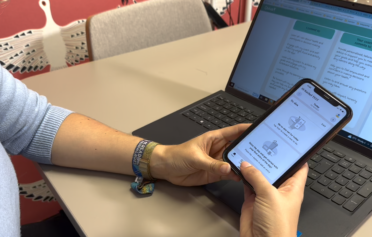
Case study: Diabetes Structured Education in Barking & Dagenham
In 2022 we were honoured to win the HSJ Partnerships Award for the “Most Impactful Project Addressing Health Inequalities” for our partnership with North East London CCG.
The purpose of the programme was to remove many of the practical barriers to accessing Type 2 diabetes services.
The introduction of Oviva’s structured diabetes education programme in Barking & Dagenham improved access and dramatically increased uptake and engagement in all groups, but in particular amongst communities which are typically under-represented in traditional healthcare services. Continue reading to learn more about our HSJ-award winning project.
There has been a global pandemic happening long before Covid-19.
Health inequalities are the preventable, unfair and unjust differences in health status between groups, populations or individuals that arise from the unequal distribution of social, environmental and economic conditions within societies, which determine the risk of people getting ill, their ability to prevent sickness, or opportunities to take action and access treatment when ill health occurs. Definition by NHS England and Public Health England.
How does Oviva help address health inequalities?
Our remote behaviour change programmes are proven to be effective in supporting people to lose weight, prevent diabetes and better manage their own health.
We provide flexibility and choice to personalise our offer to individual participants’ needs. By doing this, we remove many of the practical barriers to accessing services and therefore we achieve better uptake and engagement with groups who are often significantly under-represented in traditional face-to-face services. These groups can include:
- Working age people
- People from minority ethnic groups
- People from deprived communities
- Men
- People living with significant obesity who experience stigma
We utilise a remote first approach (digital, telephone or video), supported by our NHS Digital funded app or email/printed materials, and have experience in delivering hybrid models of care and triaging participants to the right intensity and mode of support for them.
Oviva Diabetes Support in Barking & Dagenham
Background
Barking and Dagenham has a diverse population with 53% of people living with type 2 diabetes from an ethnic minority background. In Barking and Dagenham, just 10% of people offered diabetes structured education attend the programme and ethnic minority groups are typically under-represented in traditional structured education.
Improving uptake in underrepresented groups
Barking & Dagenham CCG partnered with Oviva to deliver Oviva Diabetes Support, a digitally-enabled diabetes structured education service, with an aim to maximise attendance and completion rates.
The partnership also aimed to remove common barriers to access in this area, thereby reducing health inequalities and demands on primary care. Oviva’s flexible and personalised delivery model enables us to address the needs of the local population, tailoring support to be culturally sensitive to encourage increased uptake from underrepresented groups.
Oviva Diabetes Support programme pathway
Participants are guided through a core educational curriculum, supported by one-to-one or group personalised coaching in the form of frequent app coaching or phone calls over three stages of the 12 week programme. Participants receive personalised support to achieve meaningful and manageable changes to their diet and lifestyle, as well as a focus on improving blood glucose levels.

Start
A phone call or app contact with a diabetes specialist dietitian or health coach to explain the programme and set mutually agreed objectives.

Change
12 weeks of personalised support from a diabetes specialist dietitian or health coach (either 1:1 or groups) to achieve meaningful changes to the participant’s diet and lifestyle.

Sustain
Focusing on maintaining these new healthy behaviours for life, the patient will continue to have access to the Oviva app and learning resources.
Programme outcomes
Recruitment & retention in >1300 referrals
Demographics of attendees
We know that nationally structured education for diabetes is less likely to be taken up by men, those of working age and those from ethnic minority communities.
Impact

For years we struggled with engaging our ethnic minority communities and working-age group populations in diabetes education and self-care. The pandemic further affected the uptake of education across all patient subgroups.
Our Oviva pilot was a very timely intervention. The programme is delivered remotely but with robust one-to-one support where needed. Our patients really benefited from the multilingual dietitians who have an in-depth knowledge of the cultural influences on dietary habits.”
Dr Anju Gupta, Clinical Lead for Diabetes, Barking, Havering and Redbridge CCGs
Conclusion
Traditional diabetes structured education services have long shown extremely poor and variable levels of uptake, especially amongst underrepresented groups. The introduction of Oviva’s programme in Barking & Dagenham improved access and dramatically increased uptake and engagement in all groups, but in particular amongst underrepresented communities.
Through a remote service, participants can access convenient support to suit their timing, travel and language needs with demonstrable improvements in their self-management as seen in the confidence scores. This data demonstrates that a programme such as Oviva Diabetes Support could address England-wide low diabetes structured education uptake rates, and has the potential to improve attendance figures across Europe.
Increasing access to remote digital services, such as diabetes structured education, can also have wider benefits for the health economy, through reduced prescribing, releasing Primary and Secondary care time through the reduced risk of diabetes complications, less time needed off work for appointments and fewer non-elective admissions. This will allow all groups to better manage their own condition, preventing serious complications, and reducing inequalities in diabetes related health outcomes.
If you’d like to learn more about how Oviva could support your patients and practice, get in touch today.









